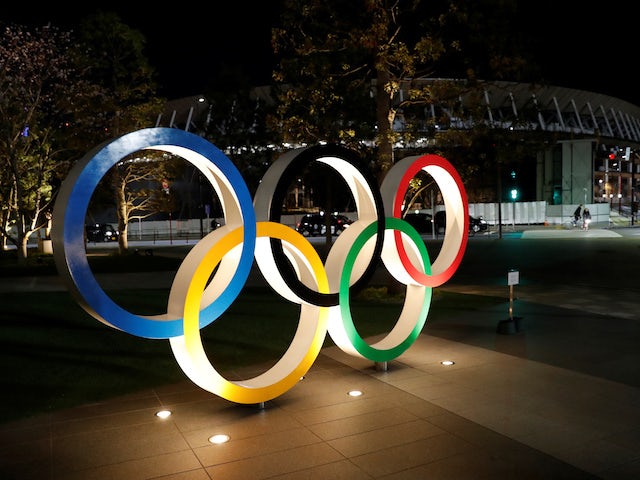Seven years after sneaking out of the Glasgow 2014 Commonwealth Games with just a pair of shoes and a weightlifting belt to his name, Cyrille Tchatchet is preparing to pack his bags for Tokyo as part of the Refugee Olympic Team.
The Cameroonian teenager’s terror at the prospect of returning to his homeland led him to leave his team’s hotel shortly after he had secured a fifth-place finish in the men’s 85kg category at the Games, and spend a night sleeping rough on the streets.
Tchatchet’s increasingly desperate journey took him to Brighton – “the farthest possible place” on the UK mainland – where, having slept under a bridge near the seafront for a number of weeks, he became consumed by the desire to take his own life.

“One morning I was thinking of what I could do to kill myself,” Tchatchet, now 25, told the PA news agency. “I remember walking to this cliff. I’m sure I would have jumped, to be honest. There was a wire fence and there was a sign on it for the Samaritans. That sign is what saved me.”
Tchatchet’s subsequent arrest and detention concluded in him gaining asylum in 2016, whereupon he trained and qualified as a mental health nurse within the NHS. He believes the 29-strong Refugee Team presents a message of hope for others around the world who may be afflicted by similar uncertainties.
“If we win medals that’s great, and if we don’t, that’s fine,” said Tchatchet. “It’s more about sending a message of hope, a message of solidarity that being a refugee doesn’t mean the end.
“I understand that a lot of refugees have to start from scratch when you get to a new country. Some have to learn a new language and it is very difficult. It is to show the whole world, and the refugees and displaced people out there, that it’s possible. It could seem difficult now, but there is hope.”
Mindful of the family members in his homeland, with whom he remains in regular contact via social media, Tchatchet is reluctant to discuss the specifics that compelled him to decide to head out into the unfamiliar Glasgow night rather than prepare for the plane ride home.
“It wasn’t really planned, it was quite sudden,” he recalled. “I competed on July 28 and the following day I picked up my bag and left. The only thing I took with me was my training bag which contained my shoes and my (weightlifting) belt. I didn’t know anywhere in Glasgow. I just slept in a corner somewhere.”
We are so thrilled to find out that a member of NHS staff will be representing the IOC Refugee Olympic Team 🙌 Cyrille (@IiCyrille) is a mental health nurse and a weightlifter and we couldn’t be prouder 💙 We’ll be supporting him all the way – please RT if you will too🏅 pic.twitter.com/pUBoLgpVCG — NHS Million 💙 (@NHSMillion) June 8, 2021
The following day, Tchatchet hitched a lift to London, and then to Brighton, where his time of sleeping rough and begging for food stretched from days into weeks, until the apparent hopelessness of his predicament became almost too much to bear.
“I started talking to this lady on the phone for a long time,” recalled Tchatchet of his attempt to establish one final thread of hope. “I was looking down (the cliff) when I was talking to her, thinking which side I was going to jump. It was real. I was in a very bad state at that point.
“She was asking me my location, so I was describing where I am, and then suddenly two police cars were behind me. And that’s how they convinced me to come back round the fence.”
VNR for the media: 29 @RefugeesOlympic athletes to send a message of solidarity and hope to the world at the Olympic Games Tokyo 2020#IOCEB #Olympics — IOC MEDIA (@iocmedia) June 8, 2021
Tchatchet was taken to a local police station where he was formally arrested for breaching immigration rules. It was the start of a tortuous process of failed appeals and sporadic incarceration, including a period at the Colnbrook Immigration Removal Centre near Heathrow, until he was finally granted asylum two years later.
Towards the end of the process he was moved to Birmingham, where he Googled a local weightlifting club and began his reintroduction to the sport. Competing in regional and national events, he went on to set four domestic records in the 96kg and 102kg categories that he still holds.
Nevertheless, Tchatchet continued to struggle with depression, and was placed on medication by his doctor, an experience that ultimately impelled him to return to London to train and qualify as a mental health nurse, specialising in the physical health of patients.

As his record-breaking weightlifting exploits continued, he was recognised and contacted by the IOC, which granted him a solidarity scholarship. It was Tchatchet’s first step on the road that would lead him to being selected as part of the second Refugee Team for Tokyo.
“I was so happy,” said Tchatchet, who is marking Refugee Week by making final preparations to meet up with his team-mates in Qatar this month prior to the Games, this time with more than just the pair of shoes and the weightlifting belt with which he decamped onto the Glasgow streets.
“It just shows that there is a reason why we do things. I have spent the last five or six years without an international passport, but it has still helped me towards achieving my biggest dream, which is to go to the Olympic Games.”
:: Anyone can contact Samaritans FREE any time from any phone on 116 123, even a mobile without credit. This number won’t show up on your phone bill. Or you can email jo@samaritans.org or visit www.samaritans.org







